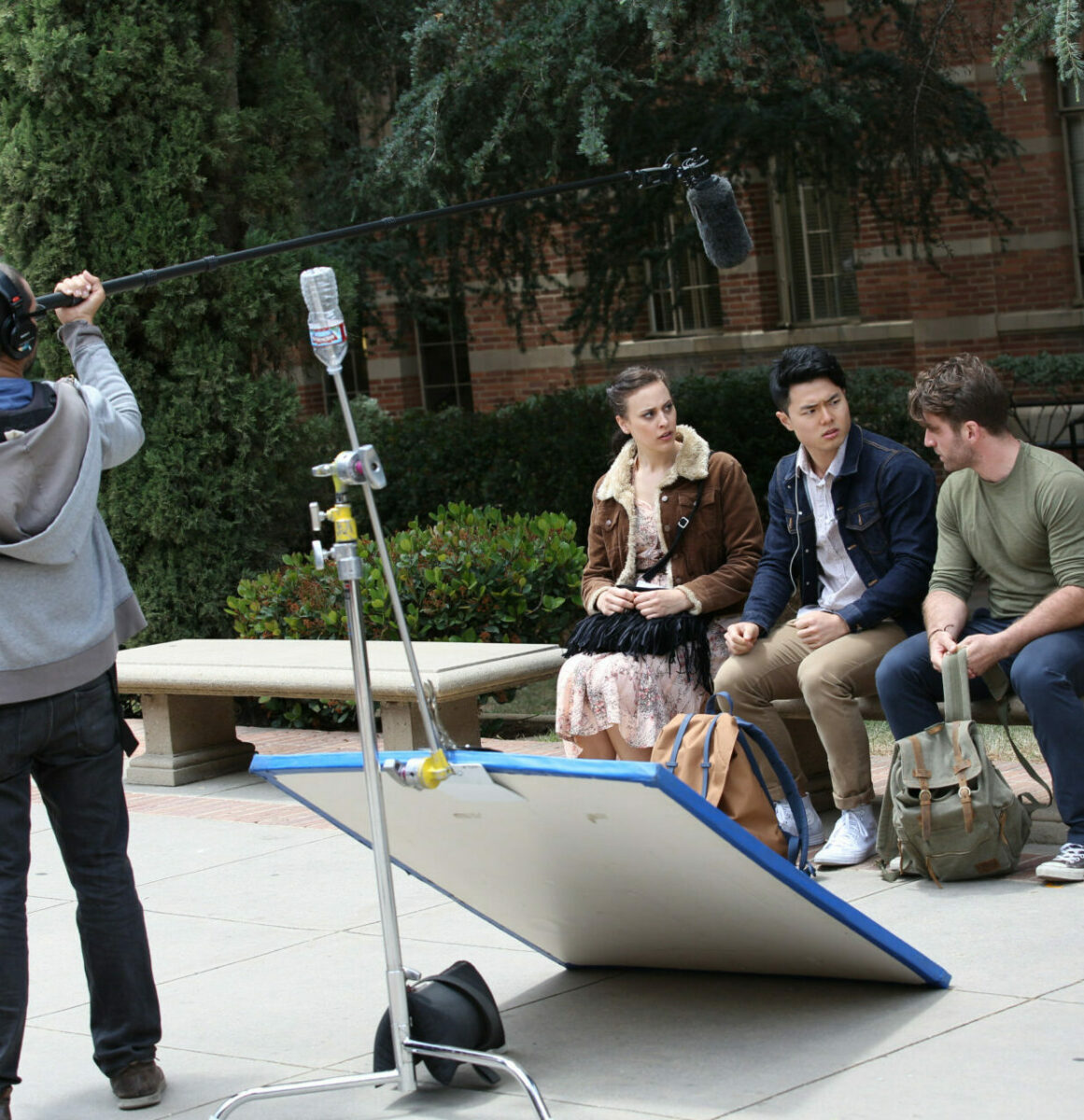TV Writing Summer Institute
Develop original TV pilots and learn how to navigate the contemporary entertainment marketplace.


Program Overview
The TV Writing Summer Institute introduces students to writing for television in Hollywood. This track mirrors the practice of professional writers in the world of episodic television and digital media by teaching students how to develop original series concepts and how to navigate the contemporary marketplace in a classroom environment that imitates the practices of a writers’ room. Under the guidance of a TV industry professional, students learn how to identify and capture the tone, characters, dialogue, and themes that make their story unique.
Participants will select one of two specializations:
Introduction to TV Writing, OR
Intermediate TV Writing for One-Hour Drama/Dramedy
Students at the introductory level write a series document, pilot outline, and the first act of the pilot script. Intermediate Drama/Dramedy level students outline and write the first draft of an original pilot and develop the series outline as a pitch document. Students in the Drama/Dramedy track should not expect this to be a polished first draft, but will leave with the feedback and tools to further revise this into a fully-realized pilot for their portfolios and careers.
In small workshops, students at all levels meet twice a week to discuss ideas, break stories, and give feedback and notes on each other’s work. All tracks offer nine units of UCLA credit. Please note that students of all specializations are expected to spend a minimum of 25 hours-per-week writing outside of class meetings. The Introduction to TV Writing Summer Institute has on-campus and online sections available.
At the conclusion of the program, Introduction and Intermediate Drama/Dramedy TV Writing students pitch their TV show ideas to television professionals in the industry for feedback and notes.
Curriculum
This program carries 9 quarter units of UC credit. Students in this track are enrolled in the following classes:
A) Introduction to TV Writing
The Introduction to TV Writing specialization is designed for students with little to no previous experience in writing for television. Students are introduced to the pilot format, covering style and content as well as the principles behind network needs and how pilots are chosen across broadcast, cable and digital platforms. Students write a series document, pilot outline, and the first act of an original pilot.
Courses:
FTV 104 Film and Television Symposium(1 unit)
FTV 131 Introduction to TV Writing (8 units)
B) Intermediate TV Writing – One-Hour Drama/Half-Hour Dramedy
This course is designed for students with some writing experience who are interested in writing for the one-hour drama format (Pose, Chernobyl, The Good Doctor, Succession, Fargo, Watchmen), half-hour drama format (Homecoming), and half-hour dramedy formats (Glow, Fleabag, Atlanta), covering style and content as well as the principles behind network needs and how pilots are chosen across broadcast, cable and digital platforms. Students outline and write the first draft of an original pilot and develop the series outline as a pitch document. Students in the Drama/Dramedy track should not expect this to be a polished first draft, but will leave with the feedback and tools to further revise this into a fully-realized pilot for their portfolios and careers. Open to works in progress and rewrites.
Courses:
FTV 104 Film and Television Symposium (1 unit)
FTV 133B Intermediate TV Writing – Drama/Dramedy (8 units)
Symposium
In the exclusive Summer Institute Symposium, students from all TV Writing levels meet and listen to some of Hollywood’s most accomplished professionals. High-wattage guests have included Eric Heisserer (writer, Arrival); Steven Canals (creator and EP of Pose on FX); Jeff King (Executive Producer of The Umbrella Academy on Netflix); Agents from CAA, ICM, Paradigm, and UTA; Simon Kinberg (Writer/Producer, Deadpool, X-Men: Apocalypse, The Martian); Zak Penn (Writer, Ready Player One); and many others.
Hollywood & the Industry
As part of the Summer Institute, students tour a major Hollywood Studio. The Film and Television Summer Institute finishes with a closing night ceremony and a networking mixer for students and alumni of our program.
Grading Basis
Students will receive a letter grade upon completion. See University Credit, Grades and Transcripts for more information about academic credit.
Professional Development
As part of the FTV 131/133B curriculum, guest lecturers with established careers in television lead professional development workshops for students from all TV Writing levels. These workshops explore topics such as How to Pitch and Demystifying the Script Coverage Process.
Demystifying the Script Coverage Process:
Script coverage is ubiquitous in the industry. A writer’s screenplays and teleplays will undergo coverage whether submitted to management companies, agencies, production companies, or studios. A main job duty of interns and assistants will be writing script coverage. Understanding and writing excellent coverage not only provides an important career skill, it allows a writer to put themselves in the shoes of the reader to aid in their writing. This workshop will introduce the basics of script analysis and the different formats of coverage reports, discuss industry uses of coverage, and familiarize students with the roles that most utilize this skill (Script Reader, Story Editor, Development Exec).
How to Pitch:
In this workshop, students will get the inside scoop of how projects are pitched and sold in Hollywood taught by a seasoned industry professional. With an eye toward the final pitch panels at the end of the session, students will learn what goes into a pitch, the elements that make it compelling, how to apply it to their own material in a way that will keep their listeners on the edge of their seats.
Pitch Panels
As a culmination of the TV Writing program, students have the opportunity to pitch their own TV show idea to a panel of accomplished industry professionals. The panel allows students to practice their pitching skills, building off of what they learned in the How to Pitch Professional Development Workshop. At the end of the pitch, the panelists give feedback to each student, drawing on their extensive insight and experience in pitching and development.
Program Details
The TV Writing Summer Institute introduces students to writing for television in Hollywood. Six weeks. On campus and online sections available.
On-Campus (Housing Optional)
Housing is available in the UCLA Residence Halls. To apply for summer accommodations, once accepted into the program, please select from the following housing options and rates and submit an application directly to UCLA Housing. It is highly recommended that you apply for housing early, as applications are approved on a first-come-first served basis.
Schedule
June 26 – August 4, 2023
NOTE: All course meeting times are in Pacific Daylight Time (PDT). The program schedule is subject to change.
Grades and Transcripts
Program participants will earn units of credit on a letter-grading basis and will be recorded on an official University of California transcript. Please note that official transcripts are not automatically sent to students. To request a transcript, please contact the UCLA Registrar’s Office.
Requirements
Eligible applicants who submit all requirements successfully and timely, will be reviewed and notified via email of an admission decision within 3 weeks. Early application is strongly encouraged.
Introduction to TV Writing:
Students with little to no previous experience in writing for television are welcome to apply. Applicants are required to provide the following during the online registration process:
A short personal statement.
Three log lines (1-2 sentences each) for three original story ideas.
Intermediate TV Writing:
Open to aspiring writers (18+) who have already completed a college level introductory screenwriting course. As part of the application, students must submit:
A short personal statement.
Three log lines (1-2 sentences each) for three original story ideas.
A 2-3 page original scene (screenplay format).
A 2-5 page scene that demonstrates creativity and a strong original voice (screenplay format), based on the following writing prompt: “Write a break-up scene between two people (e.g., partners, best friends, bandmates, etc.).” Keep in mind the visual storytelling and dialogue of the scene.
International Students
In addition to the above requirements, international students must also submit:
Proof of English proficiency – Citizens from non-English speaking countries ONLY (Citizens of the UK, Australia, New Zealand, Ireland, Singapore, and Canada are exempt from English Proficiency requirements): TOEFL – Minimum score of 79 (iBT) or 550 (PBT); IELTS – 6.5 or higher; iTEP – 5 or higher; CEFR/CAE/CPE – Level C1- Grades A, B, and C; International Baccalaureate (IB) – IB students may submit a transcript or verification of enrollment from their school; OR Proof of completion in English as a language course
Program Eligibitliy
- High school diploma (or equivalent)
- Age 18+
Financial Aid and Scholarships
Financial aid for Summer Sessions is available for qualified UC students. UCLA students can find more details about the UCLA financial aid application process by visiting the Financial Aid section of summer.ucla.edu. UC and visiting (non-UC) students should inquire about financial aid at their home institution.
Important Dates and Deadlines
June 1, 2023
Application deadline
June 15, 2023
Enrollment Deadline
Sessions
Intro:
June 26 – August 4, 2023
Admission based / In-person
Intermediate:
June 26 – August 4, 2023
Admission based / In-person